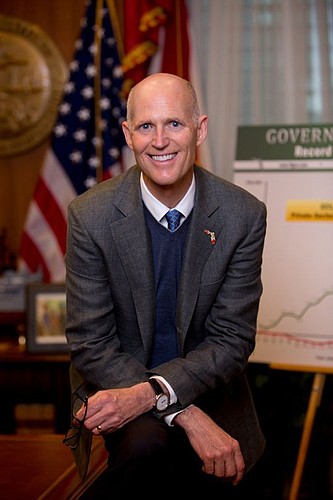
Both chambers of the Florida Legislature approved funding Friday for the newly created Florida Job Growth Grant Fund, a deal that followed months of debate among top Republicans, capped off by a three-day special legislative session.
That $85 million fund for Gov. Rick Scott will change the way the state attracts business.
But as of Monday, local leaders said they didn’t know how it would work or how it will affect business recruitment in Jacksonville.
According to the legislation, HB 1a, the Florida Job Growth Grand Fund will “promote economic opportunity by improving public infrastructure and enhanced workforce training.”
It will draw $60 million from the State Economic Enhancement and Development Trust Fund “to administer contracts” and another $25 million from the State Transportation Trust Fund “to provide for infrastructure for contracts approved by the Governor.”
The money can’t be used to exclusively attract a particular business.
The legislation said that Enterprise Florida Inc., along with the state Department of Economic Opportunity, will help to identify projects, solicit proposals and make funding recommendations to Scott, who would ultimately approve projects.
While the bill doesn’t require a comprehensive audit of potential deals, any contracts valued at $750,000 or more will be reviewed by the Legislative Budget Commission, the House speaker or Senate president within two weeks.
If they disapprove, a project might not be funded.
A Jacksonville Office of Economic Development representative was not available.
The JAX Chamber said it had no immediate comment.
Workforce training grants will support programs at both state colleges and technical centers “that provide participants with transferable, sustainable workforce skills.”
The bill states that the nonprofit CareerSource Florida Inc. will make sure those programs are appropriate for local areas.
Candace Moody, vice president of communications for CareerSource of Northeast Florida, said Monday the regional office is still taking stock of the new program.
“We just don’t know yet,” said Moody of the effects. “There are still a lot of rules that I’m sure are going to need to be finalized before we know.”
CareerSource Northeast Florida is one of 24 regional nonprofit workforce training organizations in the state.
It provides services for Baker, Clay, Duval, Nassau, Putnam and St. Johns counties.
Moody said that it helps “tens of thousands of people keep or gain employment” every year.
Part of the bill requires CareerSource to focus its programs on the state and local targeted industries, which Moody said isn’t new for the organization since it works closely with JAXUSA Partnership, the economic development arm of the JAX Chamber, to develop training.
Jacksonville-area economic developers focus on aviation, advanced manufacturing, health sciences, information technology, financial services, logistics and transportation.
Moody said that won’t change.
“Investing in people, investing in their workforce skills is extremely important if Florida wants to compete for jobs,” she said.
Scott originally asked lawmakers to set aside $85 million to expand economic incentive programs for Enterprise Florida, a public-private partnership responsible for state incentives to recruit new and expanded businesses.
Part of that would have been used to re-establish the governor’s Quick Action Closing Fund program, but the request was ignored when lawmakers presented Scott with the $83 billion budget in May.
According to the bill, Enterprise Florida won’t be giving out incentives for infrastructure or workforce training directly, but will be involved.
An Enterprise Florida spokesman said the organization is still allocated to receive $16 million in funding from the state for its operations and marketing efforts, a $7.5 million cut from the last budget.
Bill Garrison, president of the Clay Florida Economic Development Corp. in Clay County, said moving infrastructure incentives to the new fund is appropriate, considering it still will have the oversight of Enterprise Florida and the Department of Economic Opportunity.
“We work with DEO on another grant we compete for each year, and they are true professionals with managing that process,” said Garrison.
He said money for infrastructure for major development projects is essential to recruit new business to the state or to assist expansion.
“It’s really one of the key elements in that process,” he said. “It covers everything from highways, to electricity and high-speed internet, and without that commitment, it would be devastating.”
Garrison was relieved that state lawmakers compromised, but said there was a moment “when it definitely felt like the sky was falling.”
“You could have counted me amongst that group early on,” said Garrison, although he said local elected officials reassured him that a deal would be done.
“It’s true what they say about creating legislation and making sausage — it’s better if you don’t watch the process, but just enjoy the results,” he said.
(904) 356-2466